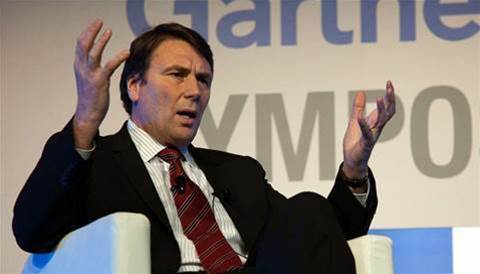The chairman of the CSIRO and head of the crucial review of the Australian Public Service, David Thodey, has likened Australia to Kazakhstan in terms of its inability to harness the technology sector as a way to diversify the national economy.

In a withering critique of future policy and research priorities delivered last night, the former Telstra chief cautioned that Australia ’s institutions need to get their game on fast in terms of developing, managing and exploiting the next wave of computing.
The comments were made during the annual Australian National University Manning Clark Lecture, with Thodey lamenting that “our technology adoption rate is around 50 percent lower than leading countries.”
A fixture on the policy circuit, the Manning Clark lecture is used as a platform to outline and debate key national policies and economic issues affecting the near and medium term future.
The 2019 address was initially slated to be given by outgoing National Australia Bank chairman and former Treasury chief Ken Henry who fell on his sword in the wake of the Banking Royal Commission.
Deftly steering clear of any partisan references or even a single mention of the NBN, Thodey unloaded a laundry list of areas that require immediate policy or corporate attention if to avoid getting whacked by the combination of economic and workplace changes wrought by automation, artificial intelligence and the internet of things.
He loves a good unpack.
Thodey’s core rationale is that Australia, no disrespect to the mining industry intended, needs to pull its head out of the dirt to stop the country being bypassed by more technologically adept competitors.
“Yes, we’ve had over 25 years of uninterrupted growth. But that growth has been largely built on resources exports and we lack economic complexity, which leaves us exposed to external shocks,” Thodey said.
“Research done at Harvard’s Centre for International Development ranks Australia at 87th in the world for economic complexity, on par with Kazakhstan and Cuba.”
“We have world-class education and healthcare, but education outcomes have been declining over the last decade, and our ageing population poses a threat to the sustainability of government finances.”
The frank assessment that the nation is simply not doing enough to insulate the economy from future shocks was backed by a joint research modelling effort between the NAB and CSIRO dubbed the “Australian National Outlook".
Thodey said the big think project roped in “50 senior leaders from across Australian businesses and non-governmental organisations” to answer a “fundamental question” of “how do we ensure that Australians enjoy the world’s best quality of life on Earth and that future generations of Australians have access to even better opportunities?”
Despite the heavily maternal mission statement, the essentially economic and social research is trying to come up with realistic scenarios of what parts of the economy will be hit, turned upside down or thrive as industry and the workplace automates.
The core aim is to paint a picture over the next 10 to 15 years that policymakers and industry can use to inform settings and decisions like where to direct investment.
A key ambition outlined by Thodey is an attempt to balance and spread technological investment and innovation across both the economy and regional Australia so that capital cities do not become the only places that create technology-enabled wealth.
“As our population grows, our cities are becoming increasingly stratified, as highly-paid services jobs become concentrated in inner-cities and increasing house prices force more people to the periphery, where poor transport options leave them stranded from high-quality jobs,” Thodey said.
Sticking to the theme of asking pertinent and hard questions, even if they avoided the spectre of broadband, Thodey did take a dig at the increasingly absurd theatre of Australian energy politics through a ‘what if’ scenario.
“If Australia’s coal exports decline by 75 percent between now and 2060, what will replace it as our next big export?,” Thodey questioned. It’s a theoretical number of course.
And the next big what if?
“How do we improve our uptake of new technologies into industry? How much of this is cultural and how do we change that?”
One stump speech at a time it appears. Another question is who is listening, and who needs to listen.
With an election around the corner, neither major party yet appears willing to bowl-up a technology policy. At least Thodey has provided them with some scaffolding.


.png&h=140&w=231&c=1&s=0)

_(20).jpg&h=140&w=231&c=1&s=0)






 iTnews Executive Retreat - Security Leaders Edition
iTnews Executive Retreat - Security Leaders Edition
 iTnews Benchmark Awards 2026
iTnews Benchmark Awards 2026
 iTnews Cloud Covered Breakfast Summit
iTnews Cloud Covered Breakfast Summit
 The 2026 iAwards
The 2026 iAwards












_(1).jpg&h=140&w=231&c=1&s=0)



